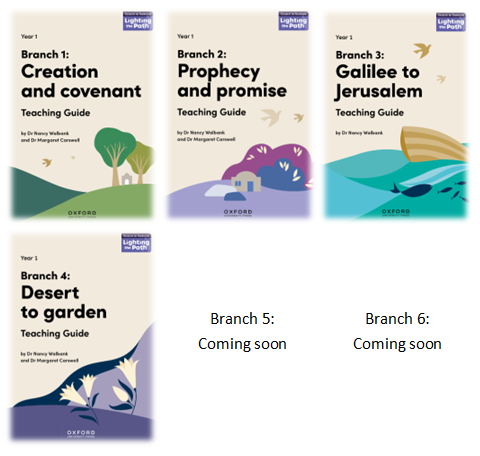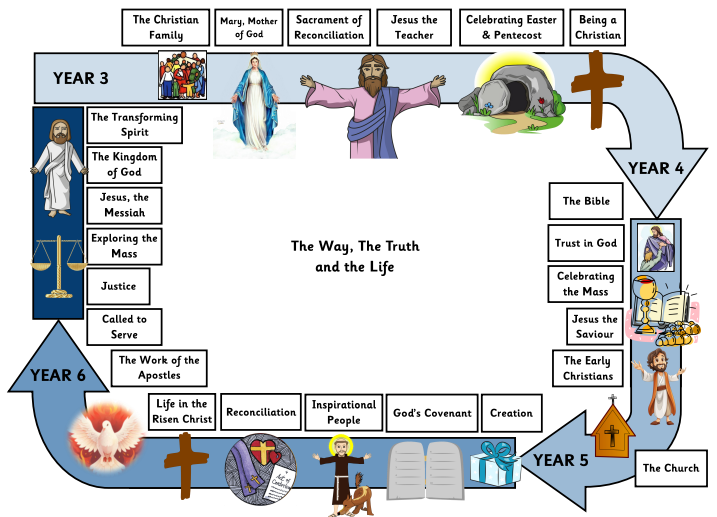RE

Religious Education is never simply one subject among many, but the foundation of the entire educational process.
(RED 2023)
Intent
In St. Anthony’s, school based Religious Education will consist of a comprehensive and systematic study of God, of the life and teachings of Jesus Christ, of His Church, the central beliefs that Catholics hold and the basis for them. It will involve consideration of the impact of these on the way of life of those who believe.
Effective Catholic Religious Education should promote a free, informed and full response of God’s call. It must seek to develop positive attitudes towards people of other Christian denominations, other Faiths and their beliefs and practices. As a school where we all strive to be our best, we believe that all learning should be adapted to the needs of all children (SEN, EAL, more able, disadvantaged) and that the curriculum should be carefully planned to take account of everyone in the class so that we can all ‘Do something beautiful for God, each and every day’.
The objectives of curriculum Religious Education in St. Anthony’s are;
To develop a growing awareness of the revelation of God as given through the Scriptures and Church teachings;
To develop knowledge and understanding of the central beliefs which Catholics hold;
To offer an experience of the ways in which these mysteries are celebrated in liturgy and prayer;
To develop and understanding of relationships with the person of Jesus;
To offer a deeper understanding of who and what we are and how we are invited to be like Jesus;
To understand what it means to be ‘church’ to the people of God;
To develop an awareness and appreciation of the Faith and an understanding of its impact on personal and social behaviour and the individual challenge implied by this awareness;
To encourage study, investigation and reflection by the pupils;
To develop appropriate skills; for example, ability to listen, to think critically. Spiritually, ethically and theologically; to acquire knowledge and organise it effectively; to make informed judgements
To foster appropriate attitudes; for example, respect for the truth, respect for the views of others; awareness of the spiritual, or moral responsibility of the demands of religious commitment in everyday life and especially the challenge of living in a multicultural, multi-faith society;
To be respectful of how children and young people learn;
To respect the experience and integrity of each child on their own journey of faith
To encourage reflection and evaluation by pupils and staff.
(Guidance on skills and attitudes in religious education is found in ‘Broad Areas of Attainment in Religious Education’, National Board of Religious Inspectors and Advisors, 1994.)
Implementation
Since the total curriculum in our school is based on the values of the Gospel and because we see all education as revealing the mystery of God, we recognise two aspects of
Religious Education in the school:-
Implicit, or unstructured Religious Education – those opportunities which arise in the course of a school day to lead pupils through curriculum content or through
relationships to a religious understanding of their implications. It is the policy of this school to use such opportunities as they arise.
Explicit, or Curriculum Religious Education – those time tabled or planned periods of time given to an explicit consideration of Religious Education in the classroom. It is the policy of this school to give 10% of the timetable at both Key stages.
To fulfil our aims and Objectives we use the Way, Truth and the Life programme to adhere to the Curriculum Directory, as prescribed by the Diocese. We use the Planning sheets provided by the Diocese of Leeds.
Impact
Children are assessed throughout the year against the End of Year Expectations. Assessment data is recorded on the school assessment system.
We assess children’s work in Religious Education by making informal judgements as we observe them during lessons and where appropriate, live mark throughout the lessons. When a piece of work has been completed, teachers comment and ask further questions to deepen a child's understanding or right any misconceptions. Children then are given time in the next lesson to read their feedback and answer any questions they have been given.
On completion of a half termly unit of work, children complete a Post-Learning Task. This is used to help make judgements on how the child's learning has developed throughout the unit. Comparisons can be made with the Pre-Learning Task that has taken place at the start of the unit.
RE work is regularly moderated both within school and within our Trust RE Leaders group.
RE Skills and Knowledge Progression Plan
Please see below to how skills and knowledge are planned for in RE at St Anthony's.
whole school re progression in skills knowledge.pdf
Lighting the Path - EYFS & KS1 NEW Curriculum 2025-26

The Way, The Truth and The Life Curriculum - KS2 only 2025-26

|
|
Autumn 1 |
Autumn 2 |
Spring 1 |
Spring 2 |
Summer 1 |
Summer 2 |
|
Year 3 |
The Christian Family |
Mary, Mother of God |
Sacrament of Reconciliation |
Jesus, the Teacher (Lent & Holy Week) |
Celebrating Easter & Pentecost
|
Being a Christian |
|
Year 4
|
The Bible |
Trust in God |
Celebrating the Mass |
Jesus, the Saviour (Lent & Holy Week) |
The Early Christians |
The Church |
|
Year 5
|
Creation |
God's Covenant |
Inspirational People |
Reconciliation |
Life in the Risen Jesus |
The Work of the Apostles |
|
Year 6 |
Called to Serve (Confirmation) |
Justice |
Exploring the Mass |
Jesus, the Messiah |
The Kingdom of God |
The Transforming Spirit
|
Progression of Vocabulary
Please click here to see how the progression of vocabulary is planned for in RE.
Examples of planning
Please click here to see an example of a Medium Term Plan for a unit in RE.
Other Faiths
 Each term, the children are taught about a different world religion.
Each term, the children are taught about a different world religion.
Below is our timetable and plan we follow:
other faiths whole school plan new.pdf





